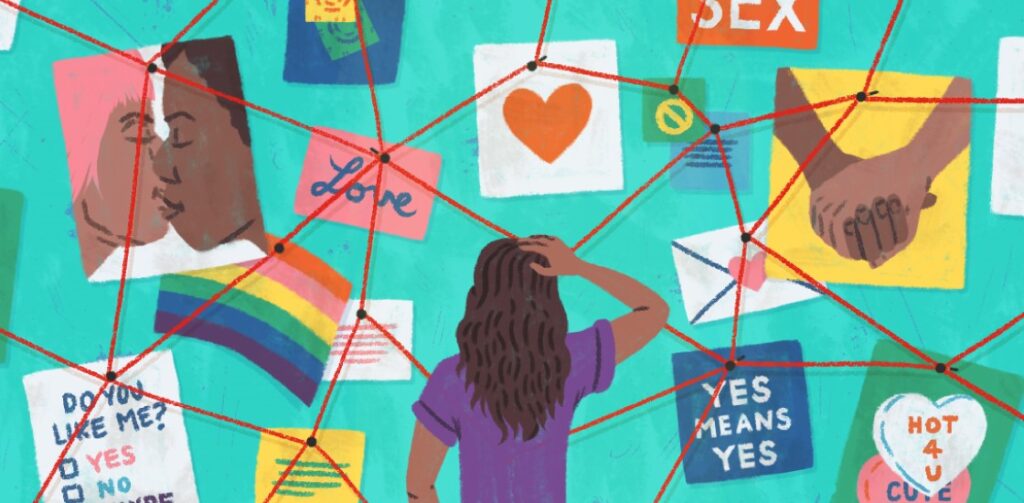Let’s Talk about Sex, Baby
Puberty is a word we’re semi-unacquainted with. Contemporary education has made us remember all the characteristic features of puberty such as breast growth, menstruation, and growth of pubic hair in women and development of the penis, deepening of the voice, the emergence of defined Adam’s apple in males, and whatnot. It does teach you about puberty, you see, it just doesn’t teach you how to navigate through it.

Everything that’s wrong
Sex education equals life skills, period. These are learnings that you actually take with you and practice throughout your life in some way or the other. Not everybody will use trigonometry or quantum physics. However, the large majority will, at some point in their life, be involved with sexuality, which is why the lack of emphasis on sex-ed in schools is not only astonishing but also repulsive.
There are so many things wrong with how sex education is conducted in school. The first being – how even if we make an effort to teach our students about sexuality and reproductive physiology, there is a designated time and space for that. Schools, institutions, parents, and other involved organizations preach about normalizing talking about sex; however, that ideology is propagated only in biannual workshops or during biology lectures.
Breaking the abstinence norm
How will we normalize sex education if we provide sex-talk an exclusive status of existing only behind closed doors? While breaking stigmas and norms may seem too Spartan in nature, it’s the first step towards normalization.
In a world where social media reigns the lives and Google is treated as a John Hopkins Medical School graduate, in the absence of having “the talk” or being told to focus on more ‘age-appropriate’ domains– teenagers will resort to seeking answers and exploring uncharted territory on the Internet, often falling in the pit hole of misinformation. Abstinence education is not education. Shaming and humiliating curious youngsters about something they wish to learn about and selling a fixed narrative of ‘abstinence until married’ is not education. This abstinence-only ideology withholds critical, science-based information young people need to make safer decisions on their sexual and reproductive health.

Destructive to instructive power
In our plight of teaching teenagers to abstain from sexual activity of any kind, we tend to overlook the fact that teenagers are curious creatures and hold a vehement desire to explore their sexuality and the world around them. During the volatile years of teenage, the frontal cortex is still developing indeed, but this curiosity is not limited to teenagers. Irrespective of their demographic, all humans possess an inherent desire to resolve the uncertainty that is independent of the consequences, says Christopher K. Hsee and Bowen Ruan in a study of curiosity’s potential adverse effects.
As educated individuals, we need to come to terms with the fact that teenagers will explore sexuality. After all, it’s a part of their identity. Explaining the risks of dangerous behaviors doesn’t necessarily act as a deterrent. Instead, it’s better to transform the destructive power of curiosity into instructive power. Instead of saying, “Don’t get intimate before you get married,” try saying, “If you do choose to indulge in intimacy, do take care of the necessary contraceptives.” At the same time, it is important to educate our children about the respective legalities of engaging in sexual activity as a minor, which is entirely different from abstinence-education and fulfills the desired purpose.

Initiating changes and building reforms
We all know the drill of sex education classes. Girls go to one classroom, and boys go to the other room. Both groups come out giggling in light of the new information they’ve acquired. This gender divide in sex education does more in building the stigma than breaking the stigma. Womxn have as much right to know about the opposite sex’s anatomy as they have their own. It takes two to tango, but in the pursuit of muting conversations about sex and resisting changes in the pop-culture, somewhere along the way, we end up losing that insight.
A common misconception about sex education today is that sex education is all about the act of indulging in sex and plants voluptuous ideas in the heads of young and rebellious kids. However, open, frank, and compassionate conversations about sex help explore other neighboring domains of consent, sexual and reproductive health, sexuality, and gender. If we initiate open and honest conversations about sex globally and teach people about consent — its reversibility and its principles, we’ll naturally observe a decline in sexual harassment cases.
By the time schools and parents initiate conversations about sex and reproduction, most children are already aware of half-baked information, acquired from different sources. Talking about vaginismus, PCOS, lubrication, contraceptives, body positivity, and erectile dysfunction amongst many others will help youngsters get more prepared for what lies ahead and beyond their teenage dream and not walk through murky waters without support.
In the Netherlands, the conversation about sex starts at the ripe age of just 4 years. As a result, children grow up talking about sex, progressively learning more and more about sex and making informed decisions. Today, the Netherlands is one of the safest countries in the world for both men and womxn.

Unavoidable presence in our culture
Sex today is part of popular culture. In the pursuit of denying and resisting that, we keep depriving teenagers of information that helps them make safe and informed decisions autonomously. We see pieces of sex and sexuality everywhere. Be it in item songs or lingerie stores; sex is everywhere.
Initiating a conversation about sex beyond the bedroom literally and metaphorically will help normalize the conversation about sex and help build critical thinking skills. Kindling discussions about objectification in media, actors and actresses in the porn-industry, sex work, harassment, and rape, among other topics, gives meaning to sex beyond the bedroom and helps normalize the conversation, making sure children make informed decisions autonomously.
Featured image: Pinterest
Author

